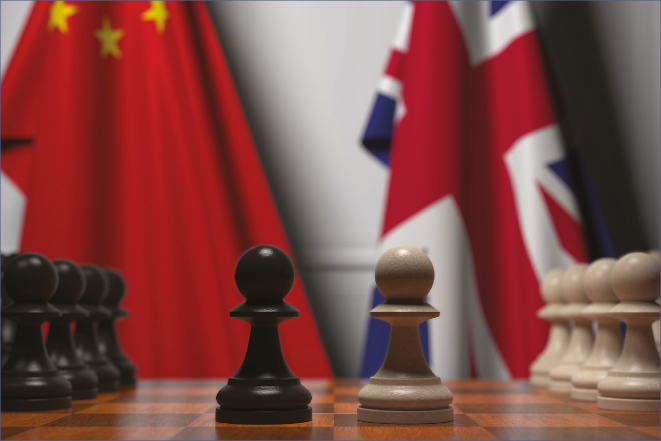FST JOURNAL
UK-China R&D Collaboration
DOI: https://www.doi.org/10.53289/ZQKZ7035
Science at the centre of the international stage
Oliver Letwin

The Rt Hon Sir Oliver Letwin FRSA was elected to Parliament in 1997. He served in the Shadow Cabinet for 10 years, including stints as Shadow Home Secretary and Shadow Chancellor. In Government from 2010 to 2016, he was Minister for Government Policy and Chancellor of the Duchy of Lancaster. He chaired the Home Affairs Committee and was a member of the National Security Council. A privy councillor since 2002, he was knighted in 2016. He is the author of a number of books including China vs America: a Warning.
In contrast to some other periods of global history, we are in a time in which geo-economics is unmistakably driving geo-politics. It seems to be abundantly clear that there is a strategic rivalry between the US and China. It is essentially a question of whose grip on the world's economy will be greater, and who will out-compete whom. It is not a Cold War because it is not directly ideological strife, although there are certainly different values and governance between the two systems. At root, there is a geo-economic rivalry.
This is not unprecedented in world history. It is broadly what happened between the UK and Germany around the beginning of the 20th century. As the incumbent leader of the world's economy, the UK and its empire were challenged by the rising economic power of Germany. Rather interestingly, the rise of the US went largely unnoticed at this point. So the first point is that geo-economics is driving geo-politics rather than vice versa.
Second, certain critical foundational technologies are at the heart of this process. Of course, the industrial revolution (which resulted in 250 years of Western supremacy and led to what many in China regard as grotesque forms of humiliation over a long period) was a technological revolution. So in that sense, there are precedents. However, that was a widespread technological revolution, covering almost every aspect of industrial production. Though coal-based, the technologies were enormously various.
Today, the foundational technologies that are driving geo-economics are much more concentrated. To take one salient example, it seems clear that AI and Big Data are at the centre of the economic rivalry between US and Chinese firms. They are also at the centre of the next wave of industrial and post-industrial revolutions. The person who controls the data and who is able to exploit the data through AI, has the capacity to transform almost every aspect of human life on Earth over coming decades. This is well recognised, both in the West and in China – as well as elsewhere. Those foundational technologies are therefore central to driving geo-politics.
Third, because of the nature of these foundational technologies, science is at the heart of geo-economics and geo-politics, to a degree that has never previously been true. Basic research and the translation of basic research into more and more applied fields is fundamental to winning the geo-economic struggle and, hence, are at the centre of geo-politics.
Geo-politics
I believe that this forms the context within which to consider how far can – and should – China and the UK collaborate in research and development. To collaborate in R&D is to operate at the centre of geo-politics. It is impossible to regard this simply as an activity with scientific and humanitarian consequences.
Collaboration also has geo-economic and geo-political consequences of the greatest possible importance. Without collaboration, not just between the UK and China, of course, but between the West and China as a whole, in these foundational technologies, we will inevitably head towards increasing decoupling and a separation of economies. That means separation from the Chinese economy and influence. That direction of change is likely significantly to impoverish both China and the West.

Indeed, the rest of the world depends on the prosperity of China and the West. The poorest people on earth depend on the continued coupling of the Chinese and Western economies in order to produce the degree of growth required to improve the economic prospects for the Global South.
There is, in fact, an even bigger problem. If decoupling occurs, instead of trust increasing distrust is bound to occur. As nations cease to collaborate with one another, they become increasingly unable to understand one another, and hence, become increasingly inclined to distrust one another. And that distrust is a very grave danger, alongside the impoverishment that beckons. Further, that distrust can easily lead to confrontation and ultimately to military confrontation. The history of the world is full of examples.
Therefore, the only way we stand any serious chance of managing competitive rivalries – and the geo-economic and geo-political consequences – is to ensure that there continues to be a large and growing amount of organised and sophisticated collaboration. However, each side needs to be operating with their eyes open, conscious of the likelihood that the other side might want to take advantage and so being realistic about the need for protections of various kinds. Equally, each side needs to be resilient towards the other rather than dependent.
That, of course. is a very difficult balance to strike. It is not easy to collaborate in ways that nevertheless ensure independence. There need to be safeguards that give sufficient protection from IP leakage, national security breaches and so on. Collaboration must be achieved in a way that does not involve excessive risk. That is not easy, but it is necessary.
I hope, therefore, that over the coming decades, instead of moving towards increasing decoupling, we move into an era of more sophisticated and eyes-open collaboration, gradually building increasing trust.
